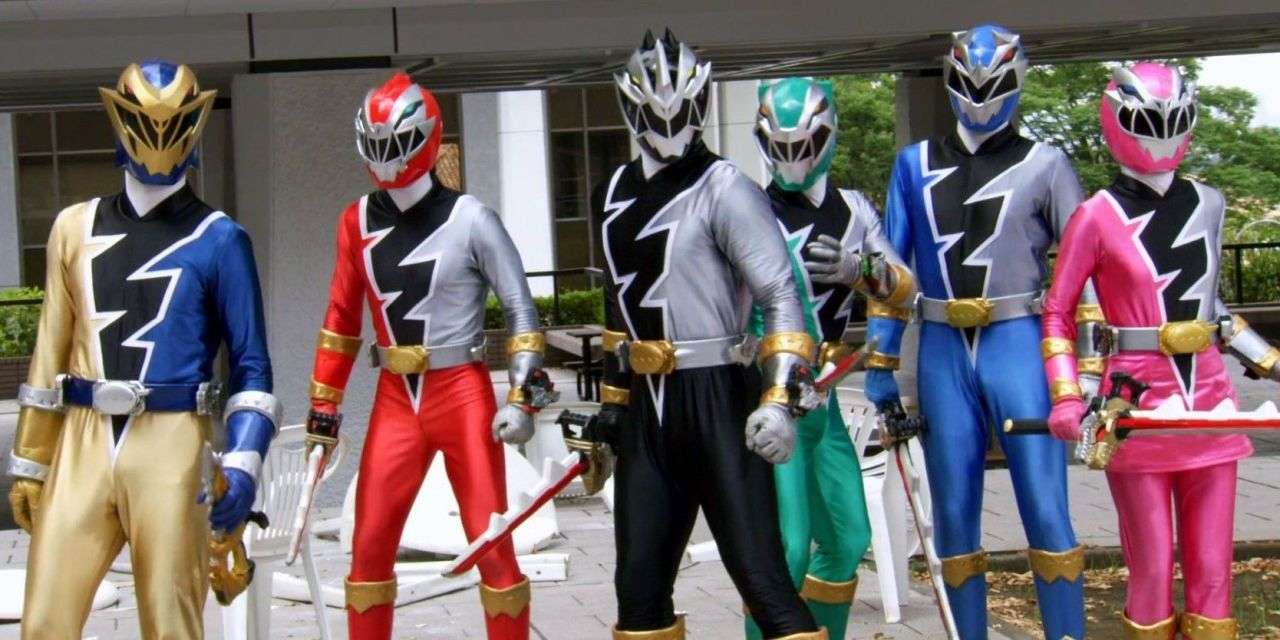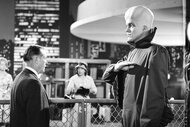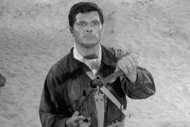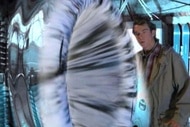Create a free profile to get unlimited access to exclusive videos, sweepstakes, and more!
Power Rangers: Dino Fury showrunner explains how the series is bending the Ranger 'rules' for all ages

Over 25 years after its debut, there's still nothing quite like the Power Rangers franchise. Save for a brief hiatus between 2009 and 2011, it has been a constant in the ever-changing landscape of American television. Channels, streaming services, and distribution houses have come and gone. Power Rangers? It's still here. There was that better-than-you-remember 2017 film, the wildly successful comic series by Boom! Studios that continues the adventures of the original Mighty Morphin team, and a whole new slate of shows and films in development from Jonathan Entwistle of I Am Not Okay With This fame. It's a great time to be a fan of Teenagers With Attitude Trademark Copyright All Rights Reserved.
Fancy reboots and comic book escapades aside, the franchise still lives on most prominently as a Saturday morning kids show. It's been airing on Nickelodeon since 2011 and is primed to welcome its next generation of multicolored spandex-clad heroes. Power Rangers: Dino Fury takes the franchise back to its prehistoric roots, welcoming a new team of Rangers who draw their power from ancient dinosaurs. Based on the Japanese show Kishiryu Sentai Ryusoulger, it premieres this weekend on Nickelodeon.
Ahead of the premiere, SYFY WIRE had a chance to chat with series showrunner Simon Bennett. A veteran of theater, television, and film alike, he spoke to us about the unique process behind the production of a show like Power Rangers, what it's like having to create a show that will appeal to what is truly an all-ages audience, and how the "rules" for making Power Rangers are easing up with Dino Fury.
Let's talk a bit about the process through which you and your team create this show, which is pretty unconventional, to say the least. How does that affect your job as showrunner?
It really is. We reverse-engineer a Japanese show called Super Sentai and what the writers do is watch each episode and extract what's considered to be usable footage from each episode. It's usually fight footage when the Rangers are masked and Zord footage. Out of our 22-minute run time, two to four minutes is Japanese footage. One of the additional challenging things about this season is that we had no idea when we were writing where Ryusoulger was going. We were writing as it was still airing. So every week the writers and I would sit down and watch an episode and try to work out what we could use, how it might fit into our overall intended story arcs.
It's interesting you mention arcs because given the show's target audience and the length of the seasons, Power Rangers tends to be far more episodic than serialized.
We're trying to, mainly for the adult fans, inject more serial threads for our characters and for our villains this time around. That can provide intrigue and suspense and allow us to use cliffhanger devices. It keeps people guessing. If every episode wraps up the story tidily, there's not much telling about what's going to happen next. With Dino Fury we've deliberately worked to inject more of that into the season.
Going back to the Sentai footage for a moment, is it common practice during production for you guys to be writing the season as the source material is being aired? Past seasons have both directly adapted seasons of Sentai and pivoted from the story context of their source material entirely.
There's no set rule. There used to be more seasons in the bank we could draw on. The better ones of those have been utilized. I think what determines what makes for a good or bad season to adapt has to do with the "toyetic" elements. Obviously the sale of toys and integrating those toys into the show is an important part of how the show works. Also, we have to think about what is going to work for an American audience. There are culturally specific things about Sentai that may not translate so easily to an American audience. For instance, dinosaurs are universally popular with four- to six-year-olds, whereas trains? Not quite as much as dinosaurs.
In terms of how loyal to the stories we are, I know that in the past there have been more or less shot-for-shot recreations of Sentai seasons. Since I've been involved with the show, and really since Chip Lynn has been on board [as a writer and frequent executive producer of the franchise], the idea has been to develop a standalone and unique story and premise that's often quite different from the source material but still to integrate the fight footage into the show.
What Haim Saban came up with all those years ago was a formula that enabled a high volume of kids shows to be made relatively inexpensively compared to if all that material had to be original footage. The Megazord fights and big stunt sequences are the expensive parts of making an action-based show. That's why four minutes or so is always Japanese footage.
You mentioned incorporating more serialized storytelling into the show to appeal to adult fans. Power Rangers has always had a fanbase that encompasses all ages. I'm wondering if, over the last few years, the people who make this show have felt less pressure to appeal to older viewers since the ascent of the Boom! Studios comic series, which very much cater to an older audience? Because at the end of the day, this does have to be a show that appeals to kids.
I wouldn't say there's ever been pressure from within to age the show up. But, you know, the adult fans who may be watching the show and love Power Rangers are the most vocal critics of the show online. Even though in terms of size they're very much a niche audience compared to the kids the show is made for. I think those comics, fantastic as they are, serve a niche function compared to the audience of the show. That's just the nature of the medium and the size of the audience they reach.
I obviously would like for everyone who watches the show to love it. I don't like the show being hated. I don't like knowing that writers get hate mail or death threats. Everyone is trying to make a show that as many people as possible will enjoy.
That's a great point. Are there any specific parameters or rules in which you guys have to operate while making the show?
There are, yes, ones that I've sort of inherited [from Power Rangers creator] Haim Saban. When he came back to the franchise halfway through a series he felt the show wasn't hitting the right notes in order to capture the younger audience. The requirements became very specific. It had to tick a number of boxes. There had to be a strong moral core, a lesson, there had to be a moving scene full of heart, and there had to be two ground fights and a Megazord fight every episode. And there could be no serial threads. He believed very strongly that every episode had to work as a standalone. The only linked episodes that were allowed were two-part finales or maybe an Episode 1 and 2 of a season.
The other thing he was keen on was the idea of the comedy duo, which harked back to Mighty Morphin' Power Rangers. It's why both Ninja Steel and Beast Morphers had the comedy duo characters. They had to use a big pinch of slapstick because that sort of broad physical comedy appeals to younger viewers. So those are some of the rules to which the writers had to write. I felt that, quite unfairly amongst the adult online community, the writers — who are very clever people and very passionate about what they do — became blamed for stuff that was outside of their control.
Having said that, I think that those kinds of mandates have eased off with Dino Fury. We're able to do a lot more that I believe will appeal to the adult audience while maintaining the engagement of younger viewers. For example, we've been able to share the comedy around. There isn't a designated comedy character who will annoy the audience and distract from the Rangers' story. There's now comedy in the villains or the Rangers. It's all shared around. And it's comedy played more through character or dialogue rather than elaborate gag sequences. We've been encouraged to do that and I've really embraced it. It means we can be less predictable.
Speaking of serialized storytelling, you worked quite a bit on [long-running New Zealand soap opera] Shortland Street. I think part of why Power Rangers has been so successful to begin with is because of the way it incorporated soap opera elements at times. How has your time working on Shortland Street influenced or aided in your approach to making this show?
I think what Shortland Street taught me, and does teach everyone who works on it in any capacity very quickly because you're working on five episodes a week across the year, is story and character. The audiences' engagement with the characters is what makes a soap work. They have to care. They have to want to know what happens next. And in order to make the audience care, there have to be well-constructed stories that are derived from character rather than imposed on character. If there's anything I learned from working on it, it's that: how character can define story.
It's very useful stuff. I think a lot of people go from soap into other forms because the intensity of a serial drama like that and the volume of work that you have to produce, you know, if you're good at what you do it really hones your skills.
I can't let you go without asking who your favorite Power Ranger is.
The ones I'm working with at the moment. [Laughs.] It's more than my life is worth to name anyone else! I love the cast I'm working with at the moment and I really enjoyed the Beast Morphers actors as well. They're just nice people and completely committed to a grueling job. They never let it get them down.
In terms of the characters on screen, it's very hard for me to separate them from the actors. I'm at the craft end of the show so I can't, watching the episode, separate what I'm watching from what I know went into making it. I will never be able to watch the show as a viewer in that sense.
Power Rangers: Dino Fury premieres on Saturday, Feb. 20 at 8 a.m. EST on Nickelodeon.


























